BMA6115 Leadership & Management: Guide to Leadership & Management
VerifiedAdded on 2023/06/15
|13
|3838
|439
Report
AI Summary
This report provides a comprehensive guide to leadership and management, addressing key aspects such as the qualities of a successful leader, the development of leadership skills, and the distinctions between leadership and management. It delves into various leadership theories, including the Great Man Theory, Katz's Three Skill Approach, Transformational Leadership Theory, and Situational Theory, highlighting their implications for effective leadership. The report further explores how good leadership can be developed through communication skills, motivation, delegation, positive attitude, responsibility, and flexibility, referencing Transformational Leadership and Leader Member Exchange theory. It contrasts leadership with management, emphasizing the importance of inspiration and influence in leadership roles. Finally, the report incorporates a self-reflective approach, drawing on personal experiences to illustrate the practical application of leadership principles. This document is available on Desklib, a platform offering a wide range of study resources for students.
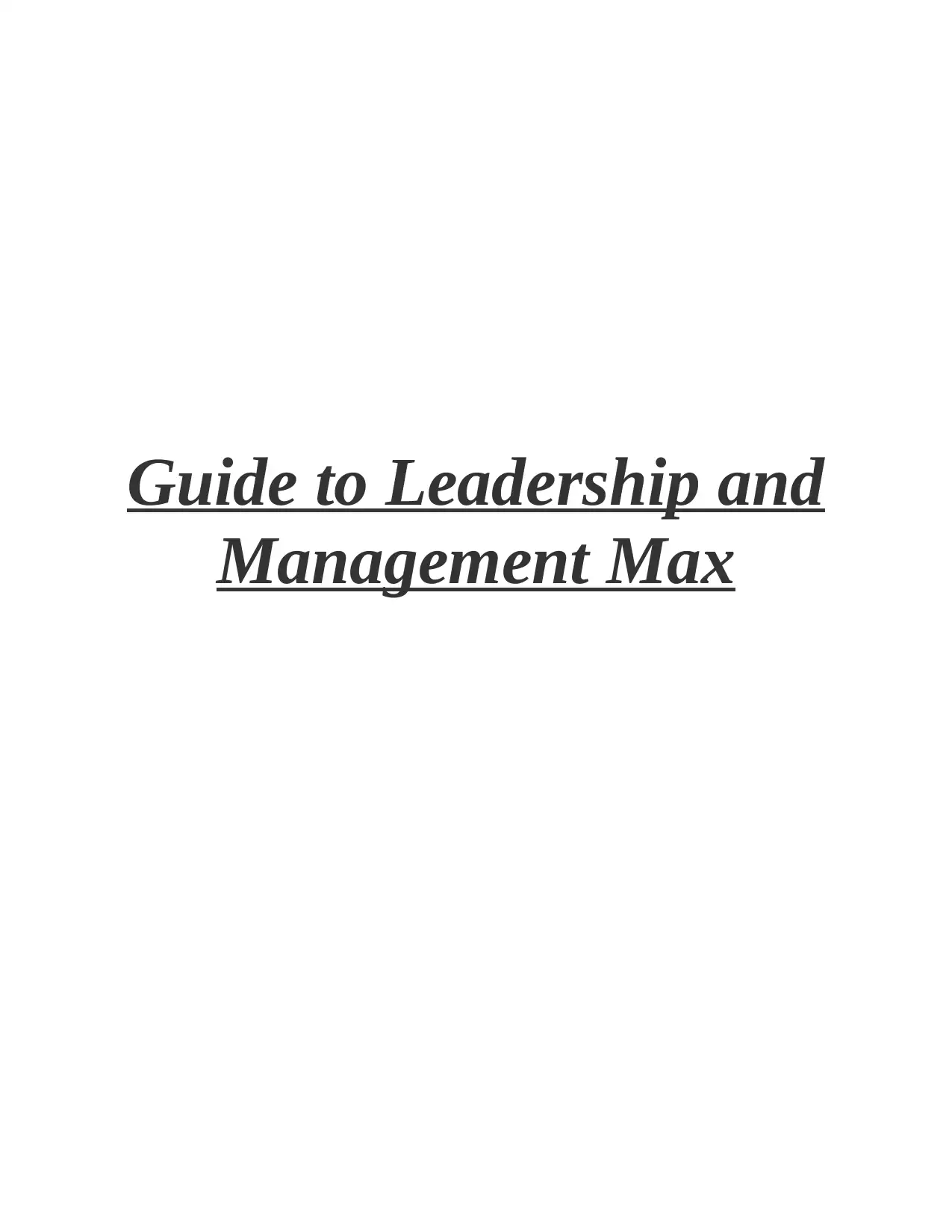
Guide to Leadership and
Management Max
Management Max
Paraphrase This Document
Need a fresh take? Get an instant paraphrase of this document with our AI Paraphraser
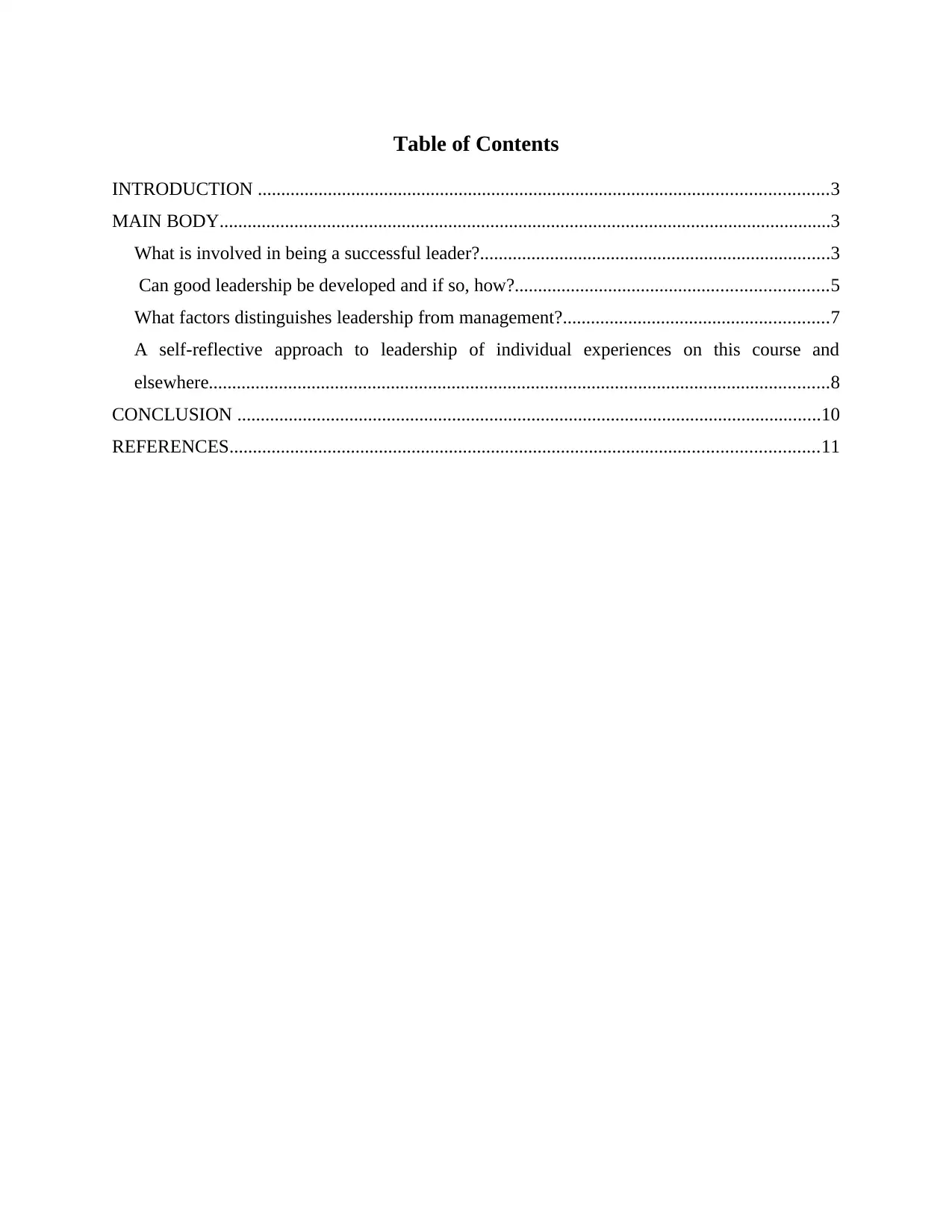
Table of Contents
INTRODUCTION ..........................................................................................................................3
MAIN BODY...................................................................................................................................3
What is involved in being a successful leader?...........................................................................3
Can good leadership be developed and if so, how?...................................................................5
What factors distinguishes leadership from management?.........................................................7
A self-reflective approach to leadership of individual experiences on this course and
elsewhere.....................................................................................................................................8
CONCLUSION .............................................................................................................................10
REFERENCES..............................................................................................................................11
INTRODUCTION ..........................................................................................................................3
MAIN BODY...................................................................................................................................3
What is involved in being a successful leader?...........................................................................3
Can good leadership be developed and if so, how?...................................................................5
What factors distinguishes leadership from management?.........................................................7
A self-reflective approach to leadership of individual experiences on this course and
elsewhere.....................................................................................................................................8
CONCLUSION .............................................................................................................................10
REFERENCES..............................................................................................................................11
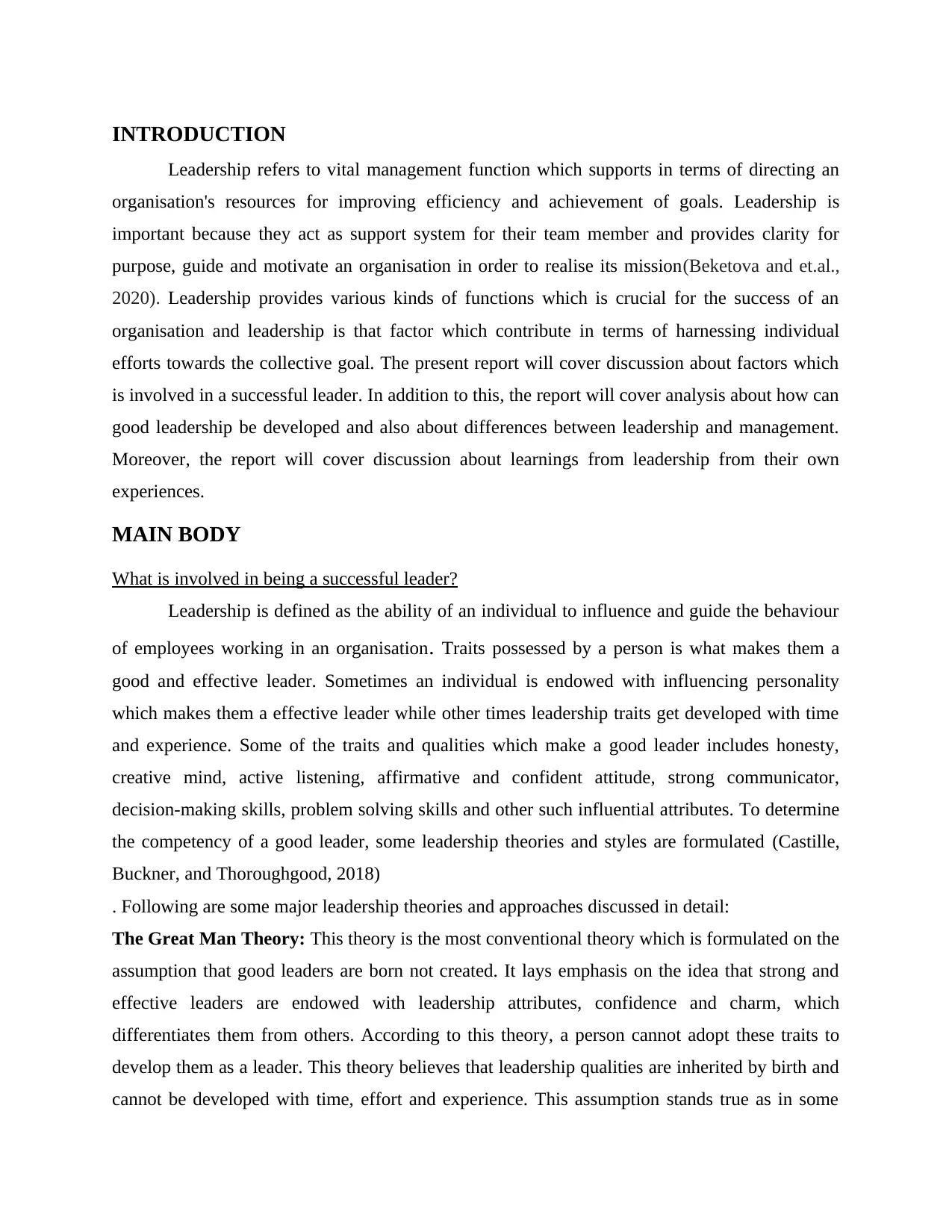
INTRODUCTION
Leadership refers to vital management function which supports in terms of directing an
organisation's resources for improving efficiency and achievement of goals. Leadership is
important because they act as support system for their team member and provides clarity for
purpose, guide and motivate an organisation in order to realise its mission(Beketova and et.al.,
2020). Leadership provides various kinds of functions which is crucial for the success of an
organisation and leadership is that factor which contribute in terms of harnessing individual
efforts towards the collective goal. The present report will cover discussion about factors which
is involved in a successful leader. In addition to this, the report will cover analysis about how can
good leadership be developed and also about differences between leadership and management.
Moreover, the report will cover discussion about learnings from leadership from their own
experiences.
MAIN BODY
What is involved in being a successful leader?
Leadership is defined as the ability of an individual to influence and guide the behaviour
of employees working in an organisation. Traits possessed by a person is what makes them a
good and effective leader. Sometimes an individual is endowed with influencing personality
which makes them a effective leader while other times leadership traits get developed with time
and experience. Some of the traits and qualities which make a good leader includes honesty,
creative mind, active listening, affirmative and confident attitude, strong communicator,
decision-making skills, problem solving skills and other such influential attributes. To determine
the competency of a good leader, some leadership theories and styles are formulated (Castille,
Buckner, and Thoroughgood, 2018)
. Following are some major leadership theories and approaches discussed in detail:
The Great Man Theory: This theory is the most conventional theory which is formulated on the
assumption that good leaders are born not created. It lays emphasis on the idea that strong and
effective leaders are endowed with leadership attributes, confidence and charm, which
differentiates them from others. According to this theory, a person cannot adopt these traits to
develop them as a leader. This theory believes that leadership qualities are inherited by birth and
cannot be developed with time, effort and experience. This assumption stands true as in some
Leadership refers to vital management function which supports in terms of directing an
organisation's resources for improving efficiency and achievement of goals. Leadership is
important because they act as support system for their team member and provides clarity for
purpose, guide and motivate an organisation in order to realise its mission(Beketova and et.al.,
2020). Leadership provides various kinds of functions which is crucial for the success of an
organisation and leadership is that factor which contribute in terms of harnessing individual
efforts towards the collective goal. The present report will cover discussion about factors which
is involved in a successful leader. In addition to this, the report will cover analysis about how can
good leadership be developed and also about differences between leadership and management.
Moreover, the report will cover discussion about learnings from leadership from their own
experiences.
MAIN BODY
What is involved in being a successful leader?
Leadership is defined as the ability of an individual to influence and guide the behaviour
of employees working in an organisation. Traits possessed by a person is what makes them a
good and effective leader. Sometimes an individual is endowed with influencing personality
which makes them a effective leader while other times leadership traits get developed with time
and experience. Some of the traits and qualities which make a good leader includes honesty,
creative mind, active listening, affirmative and confident attitude, strong communicator,
decision-making skills, problem solving skills and other such influential attributes. To determine
the competency of a good leader, some leadership theories and styles are formulated (Castille,
Buckner, and Thoroughgood, 2018)
. Following are some major leadership theories and approaches discussed in detail:
The Great Man Theory: This theory is the most conventional theory which is formulated on the
assumption that good leaders are born not created. It lays emphasis on the idea that strong and
effective leaders are endowed with leadership attributes, confidence and charm, which
differentiates them from others. According to this theory, a person cannot adopt these traits to
develop them as a leader. This theory believes that leadership qualities are inherited by birth and
cannot be developed with time, effort and experience. This assumption stands true as in some
⊘ This is a preview!⊘
Do you want full access?
Subscribe today to unlock all pages.

Trusted by 1+ million students worldwide
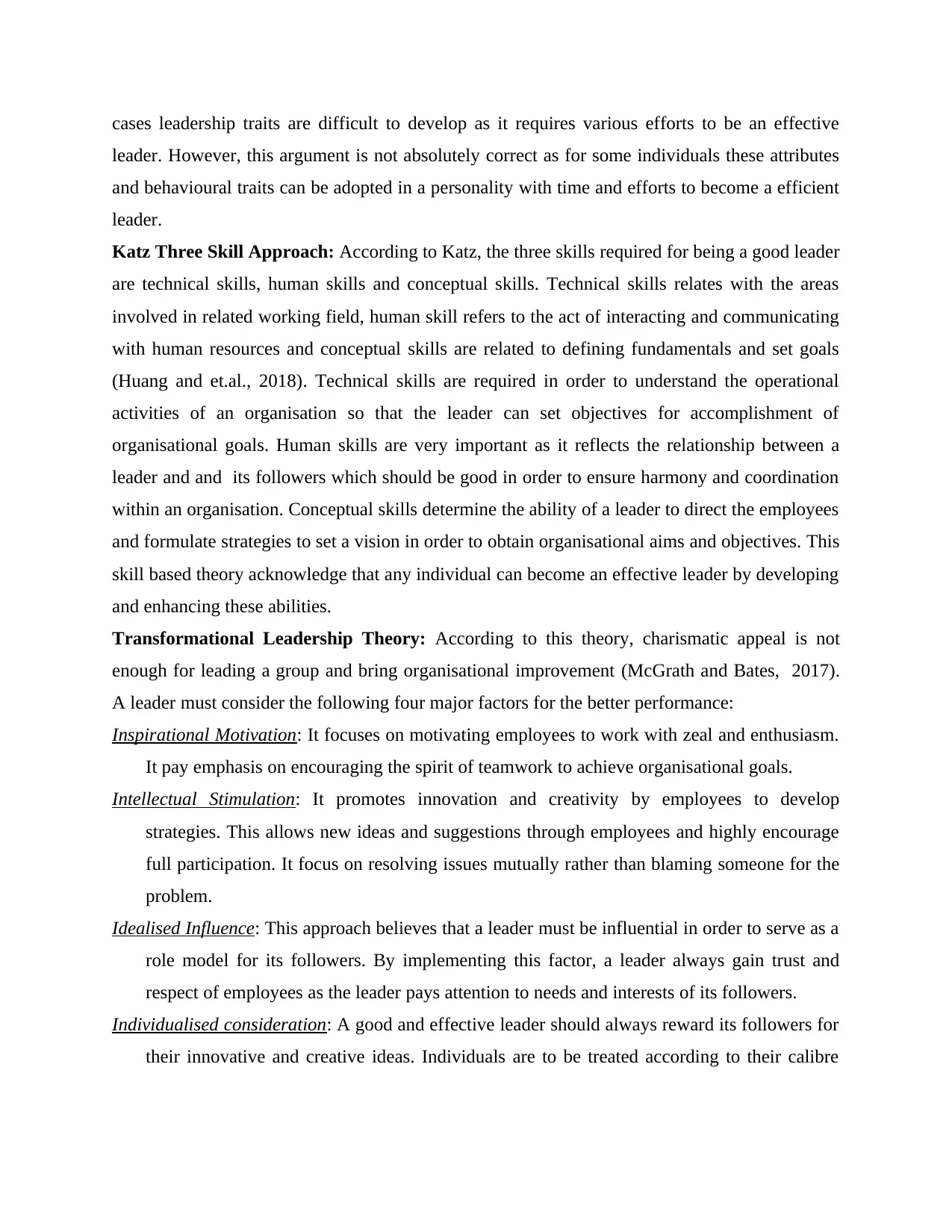
cases leadership traits are difficult to develop as it requires various efforts to be an effective
leader. However, this argument is not absolutely correct as for some individuals these attributes
and behavioural traits can be adopted in a personality with time and efforts to become a efficient
leader.
Katz Three Skill Approach: According to Katz, the three skills required for being a good leader
are technical skills, human skills and conceptual skills. Technical skills relates with the areas
involved in related working field, human skill refers to the act of interacting and communicating
with human resources and conceptual skills are related to defining fundamentals and set goals
(Huang and et.al., 2018). Technical skills are required in order to understand the operational
activities of an organisation so that the leader can set objectives for accomplishment of
organisational goals. Human skills are very important as it reflects the relationship between a
leader and and its followers which should be good in order to ensure harmony and coordination
within an organisation. Conceptual skills determine the ability of a leader to direct the employees
and formulate strategies to set a vision in order to obtain organisational aims and objectives. This
skill based theory acknowledge that any individual can become an effective leader by developing
and enhancing these abilities.
Transformational Leadership Theory: According to this theory, charismatic appeal is not
enough for leading a group and bring organisational improvement (McGrath and Bates, 2017).
A leader must consider the following four major factors for the better performance:
Inspirational Motivation: It focuses on motivating employees to work with zeal and enthusiasm.
It pay emphasis on encouraging the spirit of teamwork to achieve organisational goals.
Intellectual Stimulation: It promotes innovation and creativity by employees to develop
strategies. This allows new ideas and suggestions through employees and highly encourage
full participation. It focus on resolving issues mutually rather than blaming someone for the
problem.
Idealised Influence: This approach believes that a leader must be influential in order to serve as a
role model for its followers. By implementing this factor, a leader always gain trust and
respect of employees as the leader pays attention to needs and interests of its followers.
Individualised consideration: A good and effective leader should always reward its followers for
their innovative and creative ideas. Individuals are to be treated according to their calibre
leader. However, this argument is not absolutely correct as for some individuals these attributes
and behavioural traits can be adopted in a personality with time and efforts to become a efficient
leader.
Katz Three Skill Approach: According to Katz, the three skills required for being a good leader
are technical skills, human skills and conceptual skills. Technical skills relates with the areas
involved in related working field, human skill refers to the act of interacting and communicating
with human resources and conceptual skills are related to defining fundamentals and set goals
(Huang and et.al., 2018). Technical skills are required in order to understand the operational
activities of an organisation so that the leader can set objectives for accomplishment of
organisational goals. Human skills are very important as it reflects the relationship between a
leader and and its followers which should be good in order to ensure harmony and coordination
within an organisation. Conceptual skills determine the ability of a leader to direct the employees
and formulate strategies to set a vision in order to obtain organisational aims and objectives. This
skill based theory acknowledge that any individual can become an effective leader by developing
and enhancing these abilities.
Transformational Leadership Theory: According to this theory, charismatic appeal is not
enough for leading a group and bring organisational improvement (McGrath and Bates, 2017).
A leader must consider the following four major factors for the better performance:
Inspirational Motivation: It focuses on motivating employees to work with zeal and enthusiasm.
It pay emphasis on encouraging the spirit of teamwork to achieve organisational goals.
Intellectual Stimulation: It promotes innovation and creativity by employees to develop
strategies. This allows new ideas and suggestions through employees and highly encourage
full participation. It focus on resolving issues mutually rather than blaming someone for the
problem.
Idealised Influence: This approach believes that a leader must be influential in order to serve as a
role model for its followers. By implementing this factor, a leader always gain trust and
respect of employees as the leader pays attention to needs and interests of its followers.
Individualised consideration: A good and effective leader should always reward its followers for
their innovative and creative ideas. Individuals are to be treated according to their calibre
Paraphrase This Document
Need a fresh take? Get an instant paraphrase of this document with our AI Paraphraser
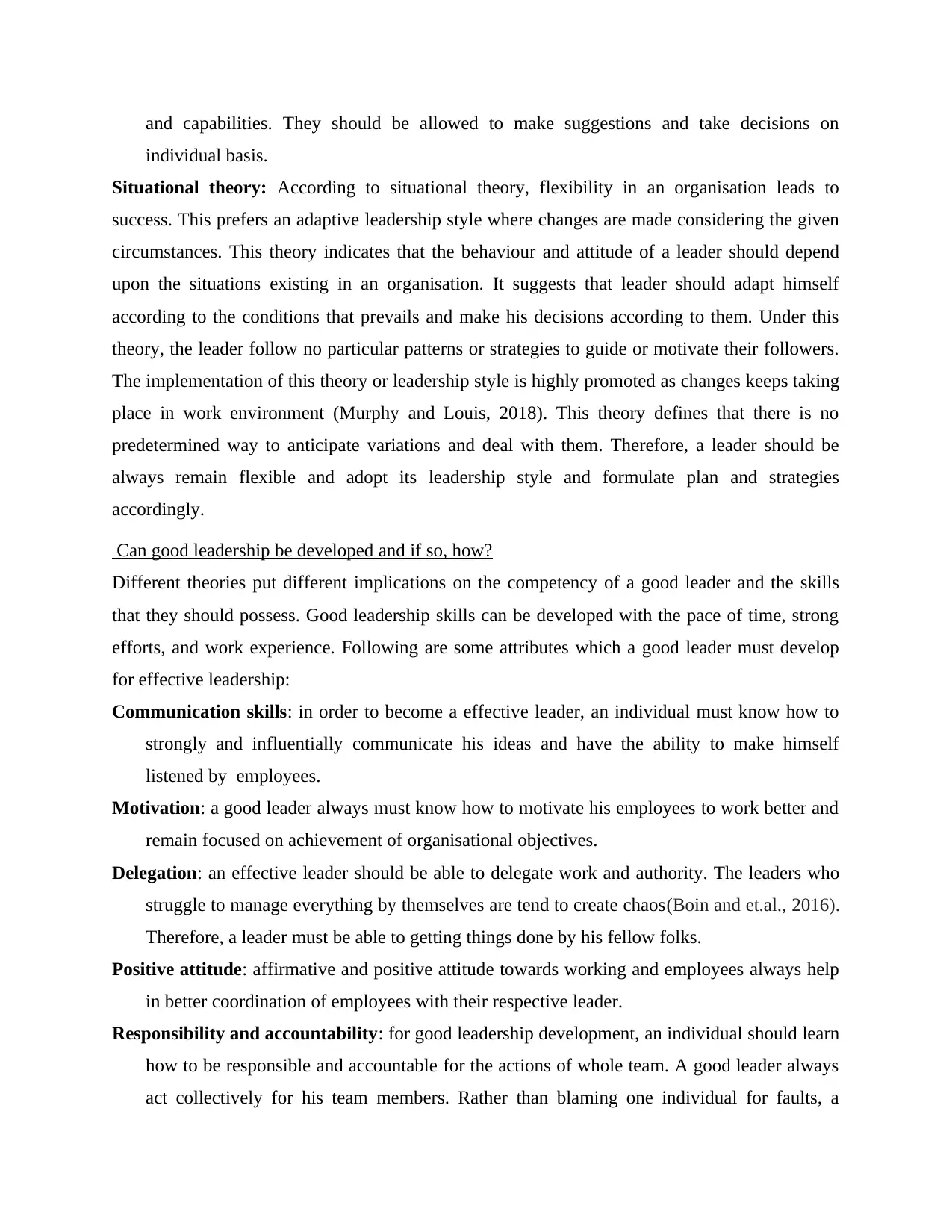
and capabilities. They should be allowed to make suggestions and take decisions on
individual basis.
Situational theory: According to situational theory, flexibility in an organisation leads to
success. This prefers an adaptive leadership style where changes are made considering the given
circumstances. This theory indicates that the behaviour and attitude of a leader should depend
upon the situations existing in an organisation. It suggests that leader should adapt himself
according to the conditions that prevails and make his decisions according to them. Under this
theory, the leader follow no particular patterns or strategies to guide or motivate their followers.
The implementation of this theory or leadership style is highly promoted as changes keeps taking
place in work environment (Murphy and Louis, 2018). This theory defines that there is no
predetermined way to anticipate variations and deal with them. Therefore, a leader should be
always remain flexible and adopt its leadership style and formulate plan and strategies
accordingly.
Can good leadership be developed and if so, how?
Different theories put different implications on the competency of a good leader and the skills
that they should possess. Good leadership skills can be developed with the pace of time, strong
efforts, and work experience. Following are some attributes which a good leader must develop
for effective leadership:
Communication skills: in order to become a effective leader, an individual must know how to
strongly and influentially communicate his ideas and have the ability to make himself
listened by employees.
Motivation: a good leader always must know how to motivate his employees to work better and
remain focused on achievement of organisational objectives.
Delegation: an effective leader should be able to delegate work and authority. The leaders who
struggle to manage everything by themselves are tend to create chaos(Boin and et.al., 2016).
Therefore, a leader must be able to getting things done by his fellow folks.
Positive attitude: affirmative and positive attitude towards working and employees always help
in better coordination of employees with their respective leader.
Responsibility and accountability: for good leadership development, an individual should learn
how to be responsible and accountable for the actions of whole team. A good leader always
act collectively for his team members. Rather than blaming one individual for faults, a
individual basis.
Situational theory: According to situational theory, flexibility in an organisation leads to
success. This prefers an adaptive leadership style where changes are made considering the given
circumstances. This theory indicates that the behaviour and attitude of a leader should depend
upon the situations existing in an organisation. It suggests that leader should adapt himself
according to the conditions that prevails and make his decisions according to them. Under this
theory, the leader follow no particular patterns or strategies to guide or motivate their followers.
The implementation of this theory or leadership style is highly promoted as changes keeps taking
place in work environment (Murphy and Louis, 2018). This theory defines that there is no
predetermined way to anticipate variations and deal with them. Therefore, a leader should be
always remain flexible and adopt its leadership style and formulate plan and strategies
accordingly.
Can good leadership be developed and if so, how?
Different theories put different implications on the competency of a good leader and the skills
that they should possess. Good leadership skills can be developed with the pace of time, strong
efforts, and work experience. Following are some attributes which a good leader must develop
for effective leadership:
Communication skills: in order to become a effective leader, an individual must know how to
strongly and influentially communicate his ideas and have the ability to make himself
listened by employees.
Motivation: a good leader always must know how to motivate his employees to work better and
remain focused on achievement of organisational objectives.
Delegation: an effective leader should be able to delegate work and authority. The leaders who
struggle to manage everything by themselves are tend to create chaos(Boin and et.al., 2016).
Therefore, a leader must be able to getting things done by his fellow folks.
Positive attitude: affirmative and positive attitude towards working and employees always help
in better coordination of employees with their respective leader.
Responsibility and accountability: for good leadership development, an individual should learn
how to be responsible and accountable for the actions of whole team. A good leader always
act collectively for his team members. Rather than blaming one individual for faults, a
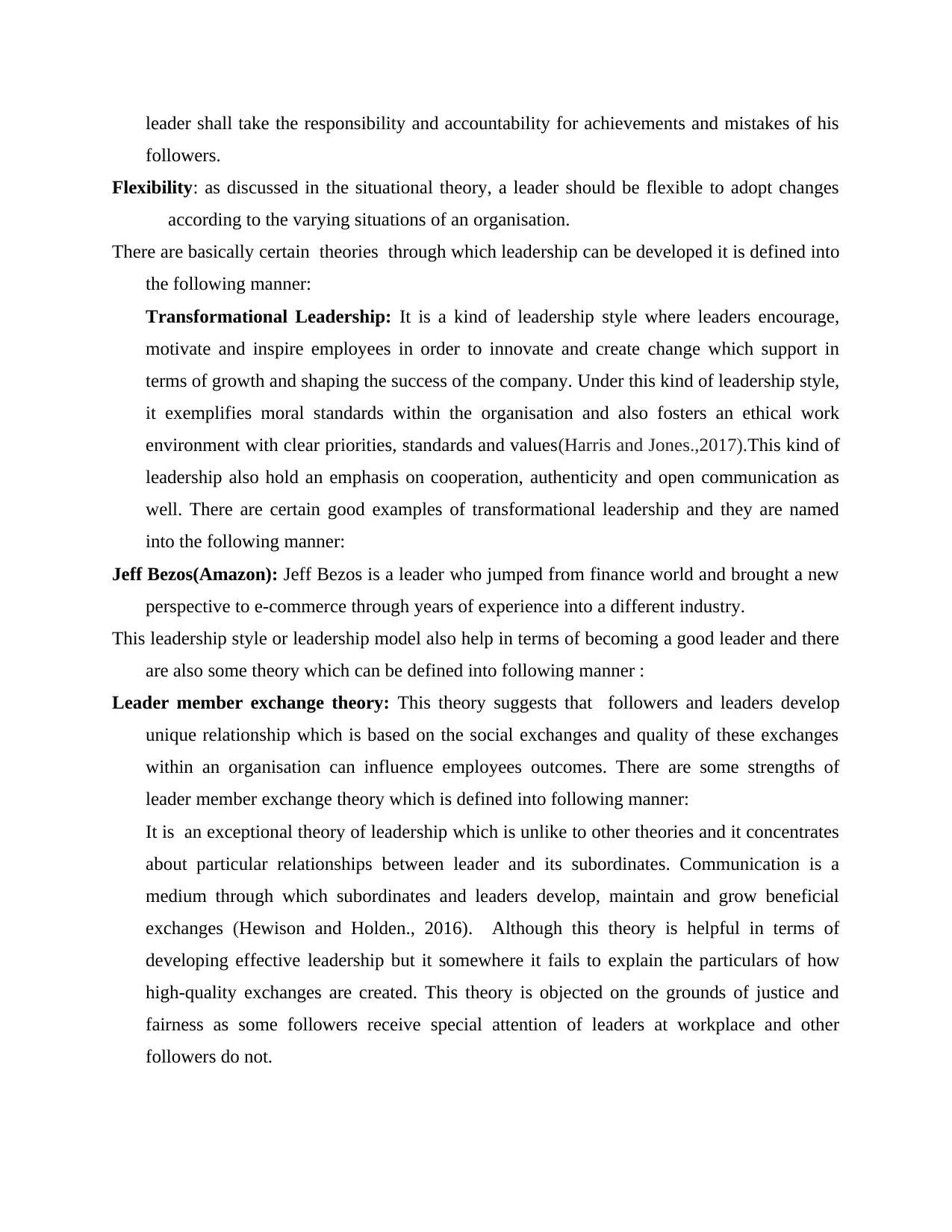
leader shall take the responsibility and accountability for achievements and mistakes of his
followers.
Flexibility: as discussed in the situational theory, a leader should be flexible to adopt changes
according to the varying situations of an organisation.
There are basically certain theories through which leadership can be developed it is defined into
the following manner:
Transformational Leadership: It is a kind of leadership style where leaders encourage,
motivate and inspire employees in order to innovate and create change which support in
terms of growth and shaping the success of the company. Under this kind of leadership style,
it exemplifies moral standards within the organisation and also fosters an ethical work
environment with clear priorities, standards and values(Harris and Jones.,2017).This kind of
leadership also hold an emphasis on cooperation, authenticity and open communication as
well. There are certain good examples of transformational leadership and they are named
into the following manner:
Jeff Bezos(Amazon): Jeff Bezos is a leader who jumped from finance world and brought a new
perspective to e-commerce through years of experience into a different industry.
This leadership style or leadership model also help in terms of becoming a good leader and there
are also some theory which can be defined into following manner :
Leader member exchange theory: This theory suggests that followers and leaders develop
unique relationship which is based on the social exchanges and quality of these exchanges
within an organisation can influence employees outcomes. There are some strengths of
leader member exchange theory which is defined into following manner:
It is an exceptional theory of leadership which is unlike to other theories and it concentrates
about particular relationships between leader and its subordinates. Communication is a
medium through which subordinates and leaders develop, maintain and grow beneficial
exchanges (Hewison and Holden., 2016). Although this theory is helpful in terms of
developing effective leadership but it somewhere it fails to explain the particulars of how
high-quality exchanges are created. This theory is objected on the grounds of justice and
fairness as some followers receive special attention of leaders at workplace and other
followers do not.
followers.
Flexibility: as discussed in the situational theory, a leader should be flexible to adopt changes
according to the varying situations of an organisation.
There are basically certain theories through which leadership can be developed it is defined into
the following manner:
Transformational Leadership: It is a kind of leadership style where leaders encourage,
motivate and inspire employees in order to innovate and create change which support in
terms of growth and shaping the success of the company. Under this kind of leadership style,
it exemplifies moral standards within the organisation and also fosters an ethical work
environment with clear priorities, standards and values(Harris and Jones.,2017).This kind of
leadership also hold an emphasis on cooperation, authenticity and open communication as
well. There are certain good examples of transformational leadership and they are named
into the following manner:
Jeff Bezos(Amazon): Jeff Bezos is a leader who jumped from finance world and brought a new
perspective to e-commerce through years of experience into a different industry.
This leadership style or leadership model also help in terms of becoming a good leader and there
are also some theory which can be defined into following manner :
Leader member exchange theory: This theory suggests that followers and leaders develop
unique relationship which is based on the social exchanges and quality of these exchanges
within an organisation can influence employees outcomes. There are some strengths of
leader member exchange theory which is defined into following manner:
It is an exceptional theory of leadership which is unlike to other theories and it concentrates
about particular relationships between leader and its subordinates. Communication is a
medium through which subordinates and leaders develop, maintain and grow beneficial
exchanges (Hewison and Holden., 2016). Although this theory is helpful in terms of
developing effective leadership but it somewhere it fails to explain the particulars of how
high-quality exchanges are created. This theory is objected on the grounds of justice and
fairness as some followers receive special attention of leaders at workplace and other
followers do not.
⊘ This is a preview!⊘
Do you want full access?
Subscribe today to unlock all pages.

Trusted by 1+ million students worldwide
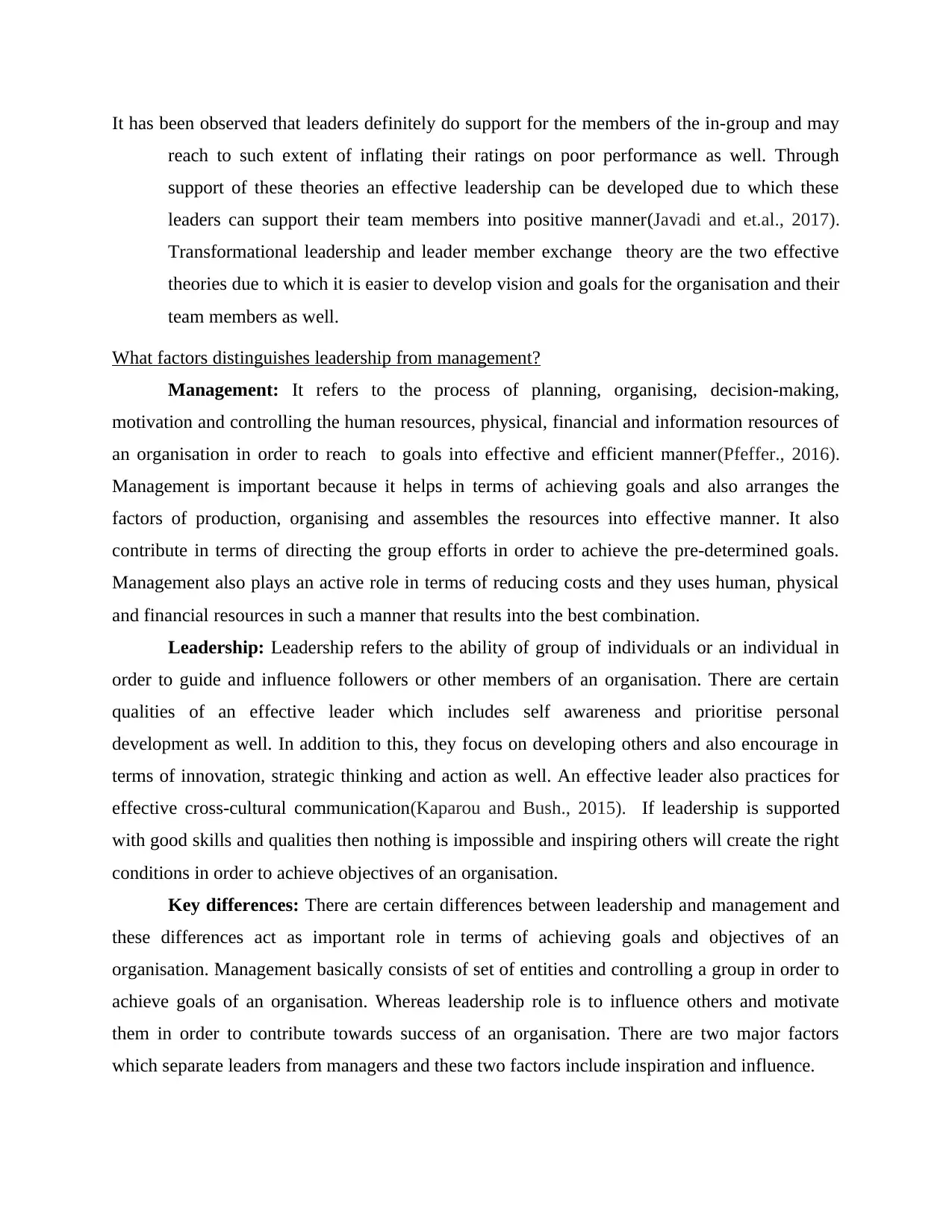
It has been observed that leaders definitely do support for the members of the in-group and may
reach to such extent of inflating their ratings on poor performance as well. Through
support of these theories an effective leadership can be developed due to which these
leaders can support their team members into positive manner(Javadi and et.al., 2017).
Transformational leadership and leader member exchange theory are the two effective
theories due to which it is easier to develop vision and goals for the organisation and their
team members as well.
What factors distinguishes leadership from management?
Management: It refers to the process of planning, organising, decision-making,
motivation and controlling the human resources, physical, financial and information resources of
an organisation in order to reach to goals into effective and efficient manner(Pfeffer., 2016).
Management is important because it helps in terms of achieving goals and also arranges the
factors of production, organising and assembles the resources into effective manner. It also
contribute in terms of directing the group efforts in order to achieve the pre-determined goals.
Management also plays an active role in terms of reducing costs and they uses human, physical
and financial resources in such a manner that results into the best combination.
Leadership: Leadership refers to the ability of group of individuals or an individual in
order to guide and influence followers or other members of an organisation. There are certain
qualities of an effective leader which includes self awareness and prioritise personal
development as well. In addition to this, they focus on developing others and also encourage in
terms of innovation, strategic thinking and action as well. An effective leader also practices for
effective cross-cultural communication(Kaparou and Bush., 2015). If leadership is supported
with good skills and qualities then nothing is impossible and inspiring others will create the right
conditions in order to achieve objectives of an organisation.
Key differences: There are certain differences between leadership and management and
these differences act as important role in terms of achieving goals and objectives of an
organisation. Management basically consists of set of entities and controlling a group in order to
achieve goals of an organisation. Whereas leadership role is to influence others and motivate
them in order to contribute towards success of an organisation. There are two major factors
which separate leaders from managers and these two factors include inspiration and influence.
reach to such extent of inflating their ratings on poor performance as well. Through
support of these theories an effective leadership can be developed due to which these
leaders can support their team members into positive manner(Javadi and et.al., 2017).
Transformational leadership and leader member exchange theory are the two effective
theories due to which it is easier to develop vision and goals for the organisation and their
team members as well.
What factors distinguishes leadership from management?
Management: It refers to the process of planning, organising, decision-making,
motivation and controlling the human resources, physical, financial and information resources of
an organisation in order to reach to goals into effective and efficient manner(Pfeffer., 2016).
Management is important because it helps in terms of achieving goals and also arranges the
factors of production, organising and assembles the resources into effective manner. It also
contribute in terms of directing the group efforts in order to achieve the pre-determined goals.
Management also plays an active role in terms of reducing costs and they uses human, physical
and financial resources in such a manner that results into the best combination.
Leadership: Leadership refers to the ability of group of individuals or an individual in
order to guide and influence followers or other members of an organisation. There are certain
qualities of an effective leader which includes self awareness and prioritise personal
development as well. In addition to this, they focus on developing others and also encourage in
terms of innovation, strategic thinking and action as well. An effective leader also practices for
effective cross-cultural communication(Kaparou and Bush., 2015). If leadership is supported
with good skills and qualities then nothing is impossible and inspiring others will create the right
conditions in order to achieve objectives of an organisation.
Key differences: There are certain differences between leadership and management and
these differences act as important role in terms of achieving goals and objectives of an
organisation. Management basically consists of set of entities and controlling a group in order to
achieve goals of an organisation. Whereas leadership role is to influence others and motivate
them in order to contribute towards success of an organisation. There are two major factors
which separate leaders from managers and these two factors include inspiration and influence.
Paraphrase This Document
Need a fresh take? Get an instant paraphrase of this document with our AI Paraphraser
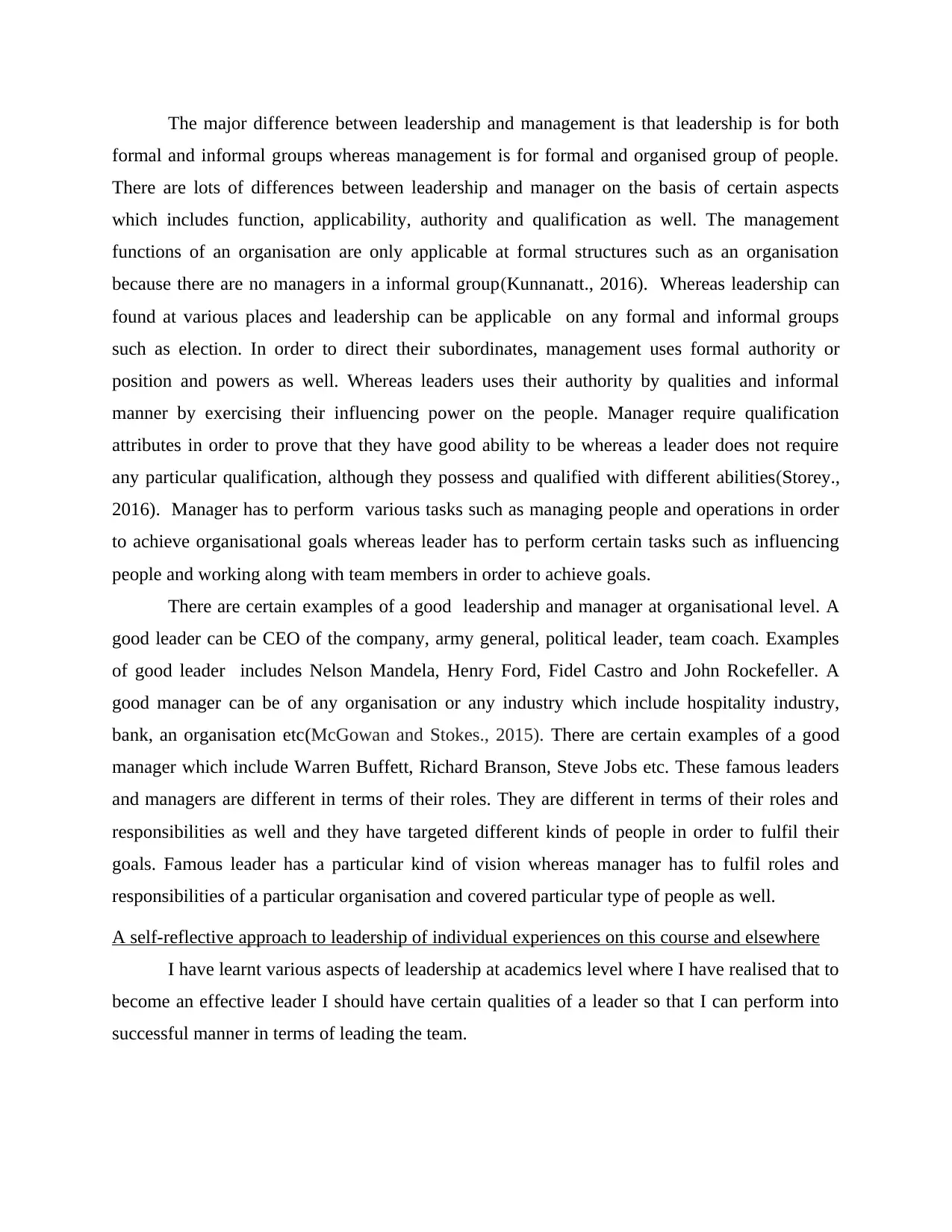
The major difference between leadership and management is that leadership is for both
formal and informal groups whereas management is for formal and organised group of people.
There are lots of differences between leadership and manager on the basis of certain aspects
which includes function, applicability, authority and qualification as well. The management
functions of an organisation are only applicable at formal structures such as an organisation
because there are no managers in a informal group(Kunnanatt., 2016). Whereas leadership can
found at various places and leadership can be applicable on any formal and informal groups
such as election. In order to direct their subordinates, management uses formal authority or
position and powers as well. Whereas leaders uses their authority by qualities and informal
manner by exercising their influencing power on the people. Manager require qualification
attributes in order to prove that they have good ability to be whereas a leader does not require
any particular qualification, although they possess and qualified with different abilities(Storey.,
2016). Manager has to perform various tasks such as managing people and operations in order
to achieve organisational goals whereas leader has to perform certain tasks such as influencing
people and working along with team members in order to achieve goals.
There are certain examples of a good leadership and manager at organisational level. A
good leader can be CEO of the company, army general, political leader, team coach. Examples
of good leader includes Nelson Mandela, Henry Ford, Fidel Castro and John Rockefeller. A
good manager can be of any organisation or any industry which include hospitality industry,
bank, an organisation etc(McGowan and Stokes., 2015). There are certain examples of a good
manager which include Warren Buffett, Richard Branson, Steve Jobs etc. These famous leaders
and managers are different in terms of their roles. They are different in terms of their roles and
responsibilities as well and they have targeted different kinds of people in order to fulfil their
goals. Famous leader has a particular kind of vision whereas manager has to fulfil roles and
responsibilities of a particular organisation and covered particular type of people as well.
A self-reflective approach to leadership of individual experiences on this course and elsewhere
I have learnt various aspects of leadership at academics level where I have realised that to
become an effective leader I should have certain qualities of a leader so that I can perform into
successful manner in terms of leading the team.
formal and informal groups whereas management is for formal and organised group of people.
There are lots of differences between leadership and manager on the basis of certain aspects
which includes function, applicability, authority and qualification as well. The management
functions of an organisation are only applicable at formal structures such as an organisation
because there are no managers in a informal group(Kunnanatt., 2016). Whereas leadership can
found at various places and leadership can be applicable on any formal and informal groups
such as election. In order to direct their subordinates, management uses formal authority or
position and powers as well. Whereas leaders uses their authority by qualities and informal
manner by exercising their influencing power on the people. Manager require qualification
attributes in order to prove that they have good ability to be whereas a leader does not require
any particular qualification, although they possess and qualified with different abilities(Storey.,
2016). Manager has to perform various tasks such as managing people and operations in order
to achieve organisational goals whereas leader has to perform certain tasks such as influencing
people and working along with team members in order to achieve goals.
There are certain examples of a good leadership and manager at organisational level. A
good leader can be CEO of the company, army general, political leader, team coach. Examples
of good leader includes Nelson Mandela, Henry Ford, Fidel Castro and John Rockefeller. A
good manager can be of any organisation or any industry which include hospitality industry,
bank, an organisation etc(McGowan and Stokes., 2015). There are certain examples of a good
manager which include Warren Buffett, Richard Branson, Steve Jobs etc. These famous leaders
and managers are different in terms of their roles. They are different in terms of their roles and
responsibilities as well and they have targeted different kinds of people in order to fulfil their
goals. Famous leader has a particular kind of vision whereas manager has to fulfil roles and
responsibilities of a particular organisation and covered particular type of people as well.
A self-reflective approach to leadership of individual experiences on this course and elsewhere
I have learnt various aspects of leadership at academics level where I have realised that to
become an effective leader I should have certain qualities of a leader so that I can perform into
successful manner in terms of leading the team.
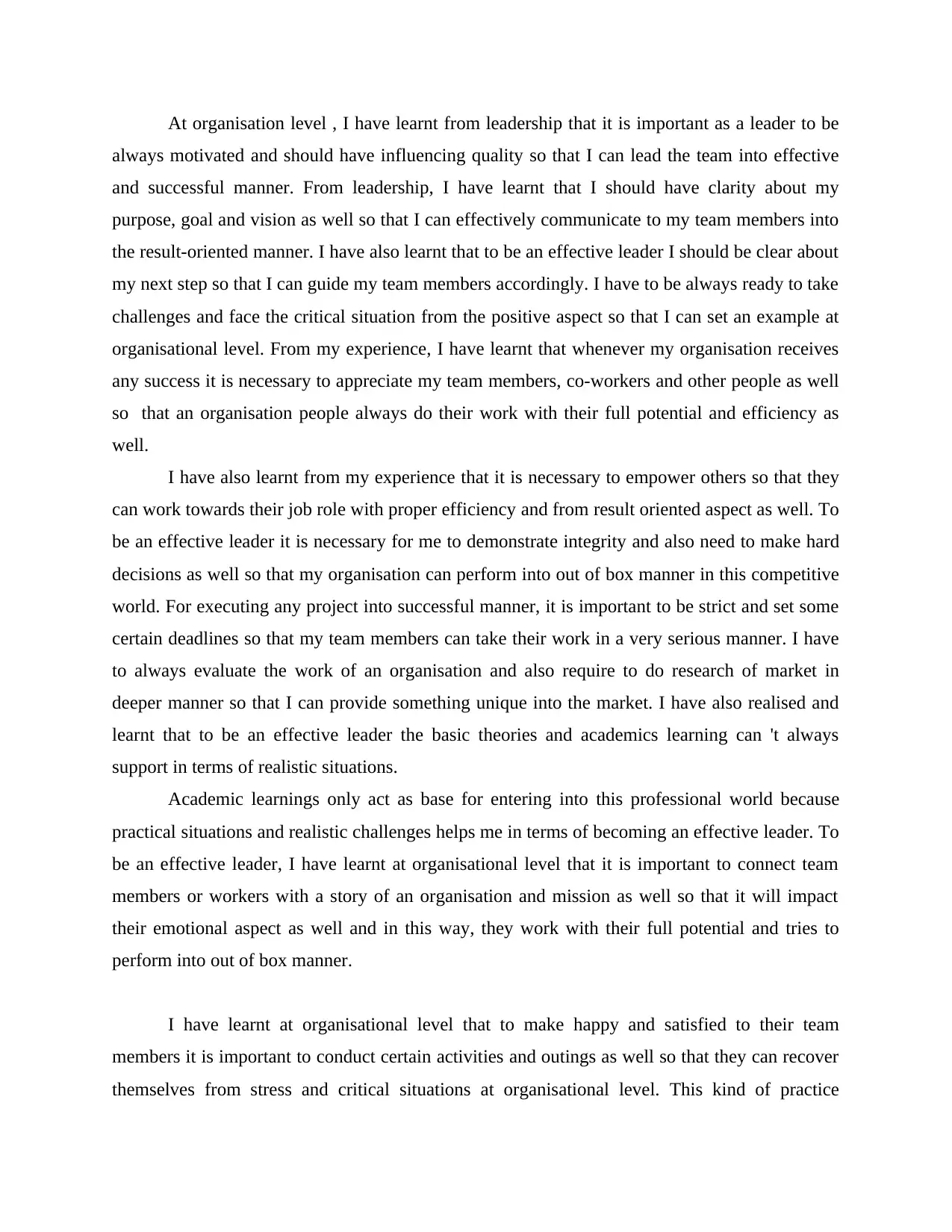
At organisation level , I have learnt from leadership that it is important as a leader to be
always motivated and should have influencing quality so that I can lead the team into effective
and successful manner. From leadership, I have learnt that I should have clarity about my
purpose, goal and vision as well so that I can effectively communicate to my team members into
the result-oriented manner. I have also learnt that to be an effective leader I should be clear about
my next step so that I can guide my team members accordingly. I have to be always ready to take
challenges and face the critical situation from the positive aspect so that I can set an example at
organisational level. From my experience, I have learnt that whenever my organisation receives
any success it is necessary to appreciate my team members, co-workers and other people as well
so that an organisation people always do their work with their full potential and efficiency as
well.
I have also learnt from my experience that it is necessary to empower others so that they
can work towards their job role with proper efficiency and from result oriented aspect as well. To
be an effective leader it is necessary for me to demonstrate integrity and also need to make hard
decisions as well so that my organisation can perform into out of box manner in this competitive
world. For executing any project into successful manner, it is important to be strict and set some
certain deadlines so that my team members can take their work in a very serious manner. I have
to always evaluate the work of an organisation and also require to do research of market in
deeper manner so that I can provide something unique into the market. I have also realised and
learnt that to be an effective leader the basic theories and academics learning can 't always
support in terms of realistic situations.
Academic learnings only act as base for entering into this professional world because
practical situations and realistic challenges helps me in terms of becoming an effective leader. To
be an effective leader, I have learnt at organisational level that it is important to connect team
members or workers with a story of an organisation and mission as well so that it will impact
their emotional aspect as well and in this way, they work with their full potential and tries to
perform into out of box manner.
I have learnt at organisational level that to make happy and satisfied to their team
members it is important to conduct certain activities and outings as well so that they can recover
themselves from stress and critical situations at organisational level. This kind of practice
always motivated and should have influencing quality so that I can lead the team into effective
and successful manner. From leadership, I have learnt that I should have clarity about my
purpose, goal and vision as well so that I can effectively communicate to my team members into
the result-oriented manner. I have also learnt that to be an effective leader I should be clear about
my next step so that I can guide my team members accordingly. I have to be always ready to take
challenges and face the critical situation from the positive aspect so that I can set an example at
organisational level. From my experience, I have learnt that whenever my organisation receives
any success it is necessary to appreciate my team members, co-workers and other people as well
so that an organisation people always do their work with their full potential and efficiency as
well.
I have also learnt from my experience that it is necessary to empower others so that they
can work towards their job role with proper efficiency and from result oriented aspect as well. To
be an effective leader it is necessary for me to demonstrate integrity and also need to make hard
decisions as well so that my organisation can perform into out of box manner in this competitive
world. For executing any project into successful manner, it is important to be strict and set some
certain deadlines so that my team members can take their work in a very serious manner. I have
to always evaluate the work of an organisation and also require to do research of market in
deeper manner so that I can provide something unique into the market. I have also realised and
learnt that to be an effective leader the basic theories and academics learning can 't always
support in terms of realistic situations.
Academic learnings only act as base for entering into this professional world because
practical situations and realistic challenges helps me in terms of becoming an effective leader. To
be an effective leader, I have learnt at organisational level that it is important to connect team
members or workers with a story of an organisation and mission as well so that it will impact
their emotional aspect as well and in this way, they work with their full potential and tries to
perform into out of box manner.
I have learnt at organisational level that to make happy and satisfied to their team
members it is important to conduct certain activities and outings as well so that they can recover
themselves from stress and critical situations at organisational level. This kind of practice
⊘ This is a preview!⊘
Do you want full access?
Subscribe today to unlock all pages.

Trusted by 1+ million students worldwide
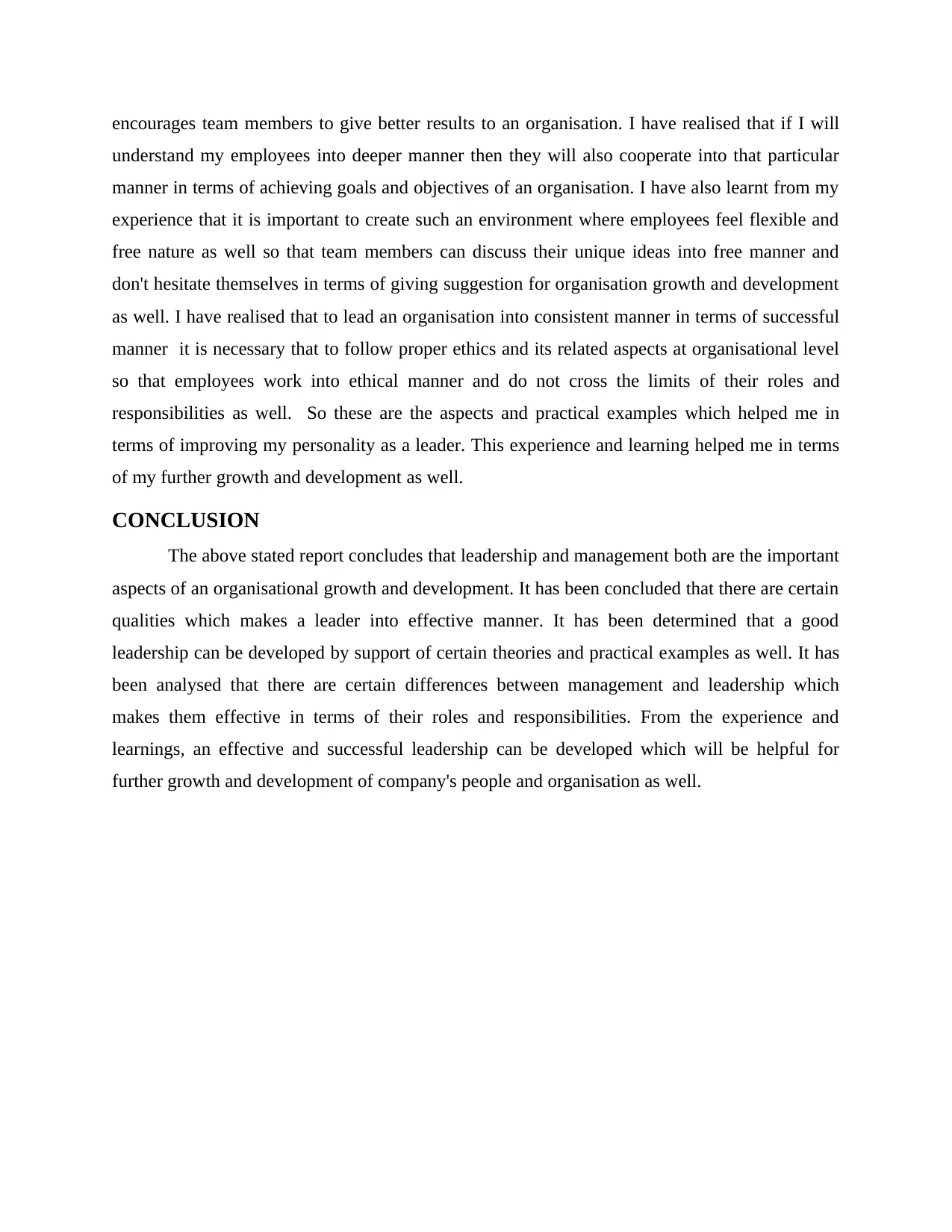
encourages team members to give better results to an organisation. I have realised that if I will
understand my employees into deeper manner then they will also cooperate into that particular
manner in terms of achieving goals and objectives of an organisation. I have also learnt from my
experience that it is important to create such an environment where employees feel flexible and
free nature as well so that team members can discuss their unique ideas into free manner and
don't hesitate themselves in terms of giving suggestion for organisation growth and development
as well. I have realised that to lead an organisation into consistent manner in terms of successful
manner it is necessary that to follow proper ethics and its related aspects at organisational level
so that employees work into ethical manner and do not cross the limits of their roles and
responsibilities as well. So these are the aspects and practical examples which helped me in
terms of improving my personality as a leader. This experience and learning helped me in terms
of my further growth and development as well.
CONCLUSION
The above stated report concludes that leadership and management both are the important
aspects of an organisational growth and development. It has been concluded that there are certain
qualities which makes a leader into effective manner. It has been determined that a good
leadership can be developed by support of certain theories and practical examples as well. It has
been analysed that there are certain differences between management and leadership which
makes them effective in terms of their roles and responsibilities. From the experience and
learnings, an effective and successful leadership can be developed which will be helpful for
further growth and development of company's people and organisation as well.
understand my employees into deeper manner then they will also cooperate into that particular
manner in terms of achieving goals and objectives of an organisation. I have also learnt from my
experience that it is important to create such an environment where employees feel flexible and
free nature as well so that team members can discuss their unique ideas into free manner and
don't hesitate themselves in terms of giving suggestion for organisation growth and development
as well. I have realised that to lead an organisation into consistent manner in terms of successful
manner it is necessary that to follow proper ethics and its related aspects at organisational level
so that employees work into ethical manner and do not cross the limits of their roles and
responsibilities as well. So these are the aspects and practical examples which helped me in
terms of improving my personality as a leader. This experience and learning helped me in terms
of my further growth and development as well.
CONCLUSION
The above stated report concludes that leadership and management both are the important
aspects of an organisational growth and development. It has been concluded that there are certain
qualities which makes a leader into effective manner. It has been determined that a good
leadership can be developed by support of certain theories and practical examples as well. It has
been analysed that there are certain differences between management and leadership which
makes them effective in terms of their roles and responsibilities. From the experience and
learnings, an effective and successful leadership can be developed which will be helpful for
further growth and development of company's people and organisation as well.
Paraphrase This Document
Need a fresh take? Get an instant paraphrase of this document with our AI Paraphraser
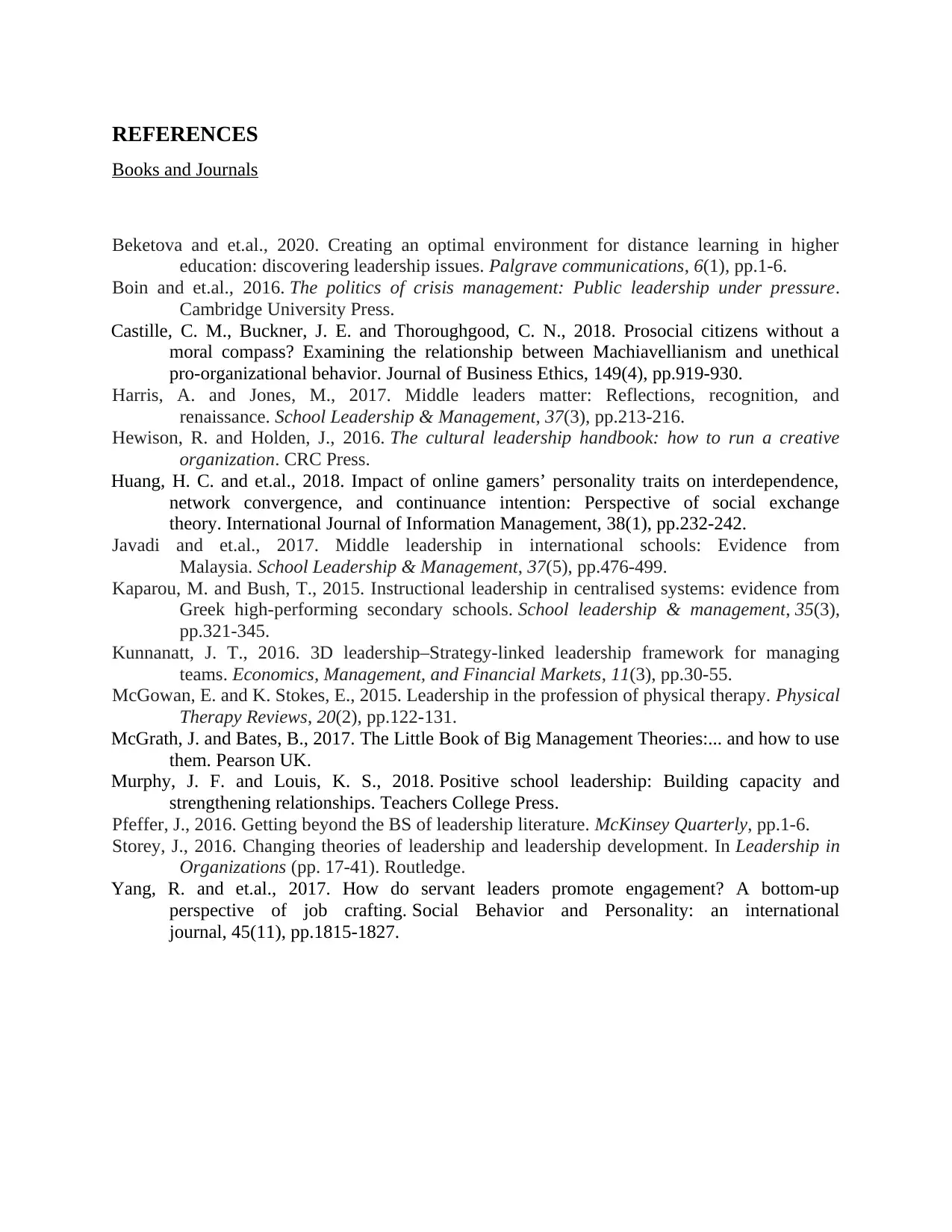
REFERENCES
Books and Journals
Beketova and et.al., 2020. Creating an optimal environment for distance learning in higher
education: discovering leadership issues. Palgrave communications, 6(1), pp.1-6.
Boin and et.al., 2016. The politics of crisis management: Public leadership under pressure.
Cambridge University Press.
Castille, C. M., Buckner, J. E. and Thoroughgood, C. N., 2018. Prosocial citizens without a
moral compass? Examining the relationship between Machiavellianism and unethical
pro-organizational behavior. Journal of Business Ethics, 149(4), pp.919-930.
Harris, A. and Jones, M., 2017. Middle leaders matter: Reflections, recognition, and
renaissance. School Leadership & Management, 37(3), pp.213-216.
Hewison, R. and Holden, J., 2016. The cultural leadership handbook: how to run a creative
organization. CRC Press.
Huang, H. C. and et.al., 2018. Impact of online gamers’ personality traits on interdependence,
network convergence, and continuance intention: Perspective of social exchange
theory. International Journal of Information Management, 38(1), pp.232-242.
Javadi and et.al., 2017. Middle leadership in international schools: Evidence from
Malaysia. School Leadership & Management, 37(5), pp.476-499.
Kaparou, M. and Bush, T., 2015. Instructional leadership in centralised systems: evidence from
Greek high-performing secondary schools. School leadership & management, 35(3),
pp.321-345.
Kunnanatt, J. T., 2016. 3D leadership–Strategy-linked leadership framework for managing
teams. Economics, Management, and Financial Markets, 11(3), pp.30-55.
McGowan, E. and K. Stokes, E., 2015. Leadership in the profession of physical therapy. Physical
Therapy Reviews, 20(2), pp.122-131.
McGrath, J. and Bates, B., 2017. The Little Book of Big Management Theories:... and how to use
them. Pearson UK.
Murphy, J. F. and Louis, K. S., 2018. Positive school leadership: Building capacity and
strengthening relationships. Teachers College Press.
Pfeffer, J., 2016. Getting beyond the BS of leadership literature. McKinsey Quarterly, pp.1-6.
Storey, J., 2016. Changing theories of leadership and leadership development. In Leadership in
Organizations (pp. 17-41). Routledge.
Yang, R. and et.al., 2017. How do servant leaders promote engagement? A bottom-up
perspective of job crafting. Social Behavior and Personality: an international
journal, 45(11), pp.1815-1827.
Books and Journals
Beketova and et.al., 2020. Creating an optimal environment for distance learning in higher
education: discovering leadership issues. Palgrave communications, 6(1), pp.1-6.
Boin and et.al., 2016. The politics of crisis management: Public leadership under pressure.
Cambridge University Press.
Castille, C. M., Buckner, J. E. and Thoroughgood, C. N., 2018. Prosocial citizens without a
moral compass? Examining the relationship between Machiavellianism and unethical
pro-organizational behavior. Journal of Business Ethics, 149(4), pp.919-930.
Harris, A. and Jones, M., 2017. Middle leaders matter: Reflections, recognition, and
renaissance. School Leadership & Management, 37(3), pp.213-216.
Hewison, R. and Holden, J., 2016. The cultural leadership handbook: how to run a creative
organization. CRC Press.
Huang, H. C. and et.al., 2018. Impact of online gamers’ personality traits on interdependence,
network convergence, and continuance intention: Perspective of social exchange
theory. International Journal of Information Management, 38(1), pp.232-242.
Javadi and et.al., 2017. Middle leadership in international schools: Evidence from
Malaysia. School Leadership & Management, 37(5), pp.476-499.
Kaparou, M. and Bush, T., 2015. Instructional leadership in centralised systems: evidence from
Greek high-performing secondary schools. School leadership & management, 35(3),
pp.321-345.
Kunnanatt, J. T., 2016. 3D leadership–Strategy-linked leadership framework for managing
teams. Economics, Management, and Financial Markets, 11(3), pp.30-55.
McGowan, E. and K. Stokes, E., 2015. Leadership in the profession of physical therapy. Physical
Therapy Reviews, 20(2), pp.122-131.
McGrath, J. and Bates, B., 2017. The Little Book of Big Management Theories:... and how to use
them. Pearson UK.
Murphy, J. F. and Louis, K. S., 2018. Positive school leadership: Building capacity and
strengthening relationships. Teachers College Press.
Pfeffer, J., 2016. Getting beyond the BS of leadership literature. McKinsey Quarterly, pp.1-6.
Storey, J., 2016. Changing theories of leadership and leadership development. In Leadership in
Organizations (pp. 17-41). Routledge.
Yang, R. and et.al., 2017. How do servant leaders promote engagement? A bottom-up
perspective of job crafting. Social Behavior and Personality: an international
journal, 45(11), pp.1815-1827.

⊘ This is a preview!⊘
Do you want full access?
Subscribe today to unlock all pages.

Trusted by 1+ million students worldwide
1 out of 13
Related Documents
Your All-in-One AI-Powered Toolkit for Academic Success.
+13062052269
info@desklib.com
Available 24*7 on WhatsApp / Email
![[object Object]](/_next/static/media/star-bottom.7253800d.svg)
Unlock your academic potential
Copyright © 2020–2026 A2Z Services. All Rights Reserved. Developed and managed by ZUCOL.





